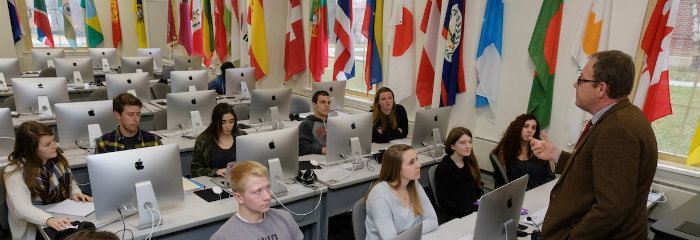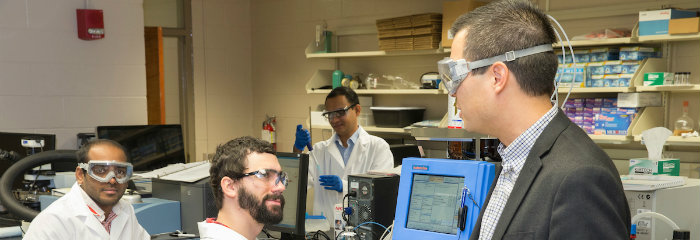
OER: Adopt Program


This program enables faculty to select an open educational resource to replace a commercially produced textbook for one of their courses and to assess its use in comparison to the traditional, commercial textbook.
Up to three amounts of $500.00 in professional development funds will be transferred upon successful completion of each phase ($1500.00 total).
Phase 1: The faculty member will
- Teach the course using the traditional, commercially-produced and required materials;
- Assess the impact of the traditional textbooks or required materials on the course outcomes and on student learning (assistance for assessment will be available but must be addressed in your application);
- Select and organize OER materials for the course (assistance from librarians will be available but must be addressed in your application);
- Develop an assessment mechanism for measuring the impact of the OER on the course outcomes and student learning, and on student and faculty satisfaction. Please note: instructors must be willing to participate in an evaluation/assessment process including administering a Student Assessment of Their Learning Gains (SALG), completing a faculty survey, and meeting with the University Affordable and Open Educational Resource Committee (AOERC).
Phase 2: The faculty member will
- Teach the course using the selected OER materials;
- Assess the impact of the OER on the course outcomes and student learning, and on student and faculty satisfaction. Faculty must be willing to participate in an evaluation/assessment process which involves completing an SALG, reflecting on the effectiveness of the OER in the final report, and meeting (upon request) with the University AOERC Committee. The faculty member may also opt to conduct additional assessments beyond those listed here.
Phase 3: The faculty member will
- Make any revisions based on previous assessment, and continue to teach the course using OER materials;
- Evaluate the impact of the OER on the course outcomes and student learning, and on student and faculty satisfaction as well as plan for future use;
- Communicate the work to a wider audience (colleagues, peers in the profession);
- File a final report with the University OER Committee;
- Upload any OER created or modified in the course to the OER Collection in Miami’s institutional repository, the Scholarly Commons.
Information on New Courses
In the case of new courses that are planned with OER from their inception, applicants should calculate the cost of equivalent traditional required materials and estimate the expected enrollment in the course. In these cases, the OER: Adopt funding will only consist of two phases and the professional development funds will consist of two amounts of $1000.00. Applications involving new courses may be submitted when courses are at any point in the course approval process.
For more information on OER, please see Libraries' OER LibGuide or contact Carla Myers, Scholarly Communications Coordinator at myersc2@MiamiOH.edu or 513 529-3935.
OER: Adopt Application
Applications are considered on a rolling basis during the academic year. Applications submitted between April 1 and August 1 will be reviewed during the following fall semester. Application forms can be accessed via a Canvas site. Please contact Carla Myers, Scholarly Communications Coordinator, at myersc2@MiamiOH.edu or Amy Bergerson, Associate Provost and Dean for Undergraduate Education, at bergera9@MiamiOH.edu for access to the Canvas site.
Information that will be asked on the application form
Applicant Information
- Principal researcher (first name, last name):
- Academic Rank/Position:
- Department:
- Phone Number:
- Email Address:
Description of Application
- Short Title:
- Is this a new course? Y/N
- Name of course listed in this application:
- Three letter department abbreviation and number of course listed in this application:
- Catalog description of course listed in this application:
- Next term in which this course will be offered:
- Frequency with which this course is offered:
- Maximum number of enrolled students:
- Average number of enrolled students (Calculate this based on the last three iterations of the course if possible. See “Information on new courses” note for calculating enrollment for new courses.):
- Current traditional textbook or other materials used (title and ISBN):
- Total cost of textbook (and other course materials) each student is required to purchase for this course (Calculate this using the retail price for a new copies of the work. Do not include the cost of supplemental materials. See section on new courses for how the cost of textbooks should be calculated in such courses.):
- Briefly describe potential suitable OER in major repositories:
- Identify gaps in the available OER, and briefly assess your own ability to adapt OER that will fill those gaps:
- How will students access the alternative content?
- Indicate how the OER materials will address issues of accessibility for students with visual impairments. [NOTE: assistance can be provided, if needed, to help with accessibility issues].
- State the outcomes for your project:
- Describe your plan for evaluating the outcomes. How will you know they were achieved?
- Outline any additional assessment mechanisms for measuring the impact of traditional textbooks and OER on the course outcomes and student learning beyond the ones required (e.g., SALG, reflection on the impact and possible presentation to OER Committee):
- What are your greatest concerns about adopting an alternative textbook solution (for yourself and or your students)?
Applicants are strongly encouraged to consult with librarians, instructional technologists, and CTE staff during the preparation of the application.
- I have consulted with the following people:
Other Support for Current Application
- Have you applied for or been granted any external or other internal sources of funding for this application?
Additional Materials
Attach a current CV or resume that includes courses taught at Miami University.
For more information on OER, please see Libraries' OER LibGuide or contact Carla Myers, Scholarly Communications Coordinator at myersc2@MiamiOH.edu or 513 529-3935.

